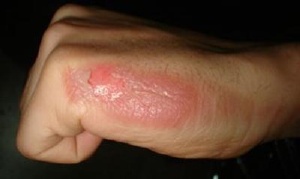Jul 22 2009
Scientists in India are reporting successful laboratory tests of a new and potentially safer alternative to silver-based gels applied to the skin of burn patients to treat infections. With names like silver sulfadiazine and silver nitrate, these germ-fighters save lives and speed healing. The researchers describe gel composed of silver nanoparticles - each 1/50,000th the width of a human hair - that appears more effective than these traditional gels. Their study is scheduled for the Aug. 3 issue of ACS' Molecular Pharmaceutics, a bi-monthly journal.

Kishore Paknikar and colleagues note that antimicrobial silver compounds have been used for decades on burn patients, whose damaged skin is highly vulnerable to bacterial infections. However, topical silver agents now in use can loose effectiveness in the body, cause skin discoloration, and damage cells. Drug-resistant bacteria can make these treatments less effective.
The scientists demonstrated that their gel killed a broad range of harmful bacteria, including Pseudomonas aeruginosa, one of the most common causes of burn infections, as well as several drug-resistant microbes. The gel, which contains 30 times less silver than silver sulfadiazine, did not have any apparent toxic effects when applied to the healthy skin of test animals. "These results clearly indicate that silver nanoparticles could provide a safer alternative to conventional antimicrobial agents in the form of a topical antimicrobial formulation," the article states.